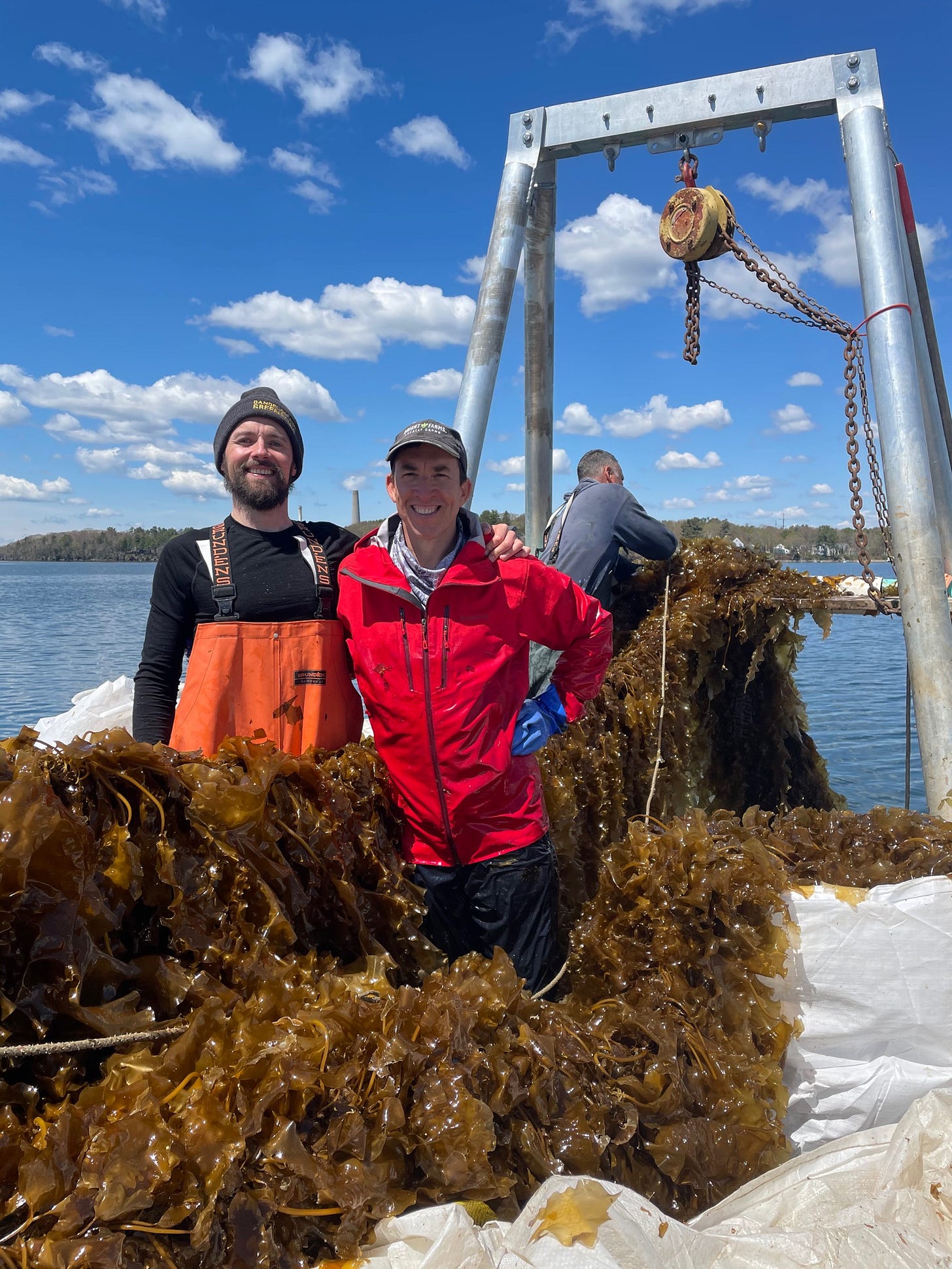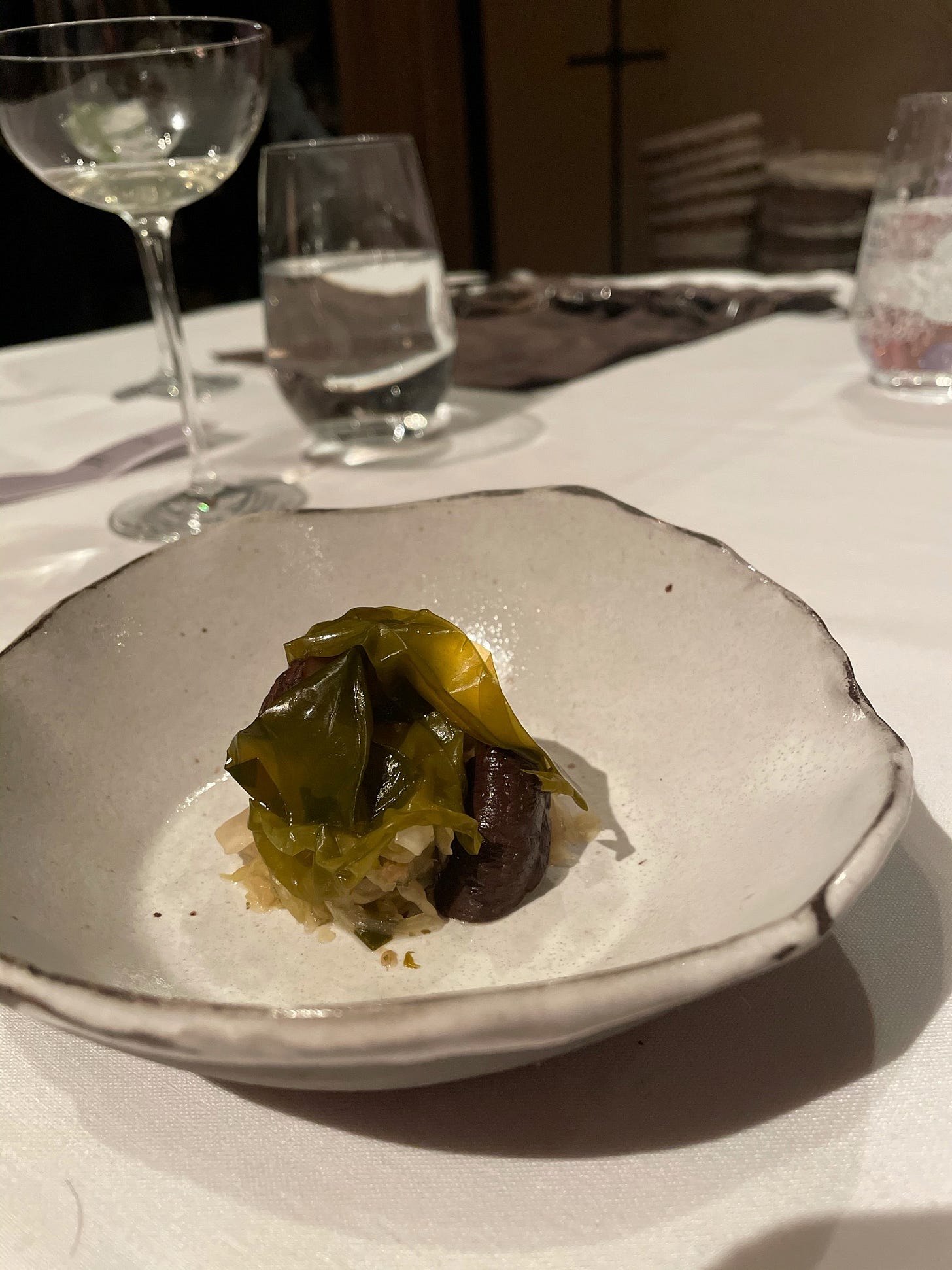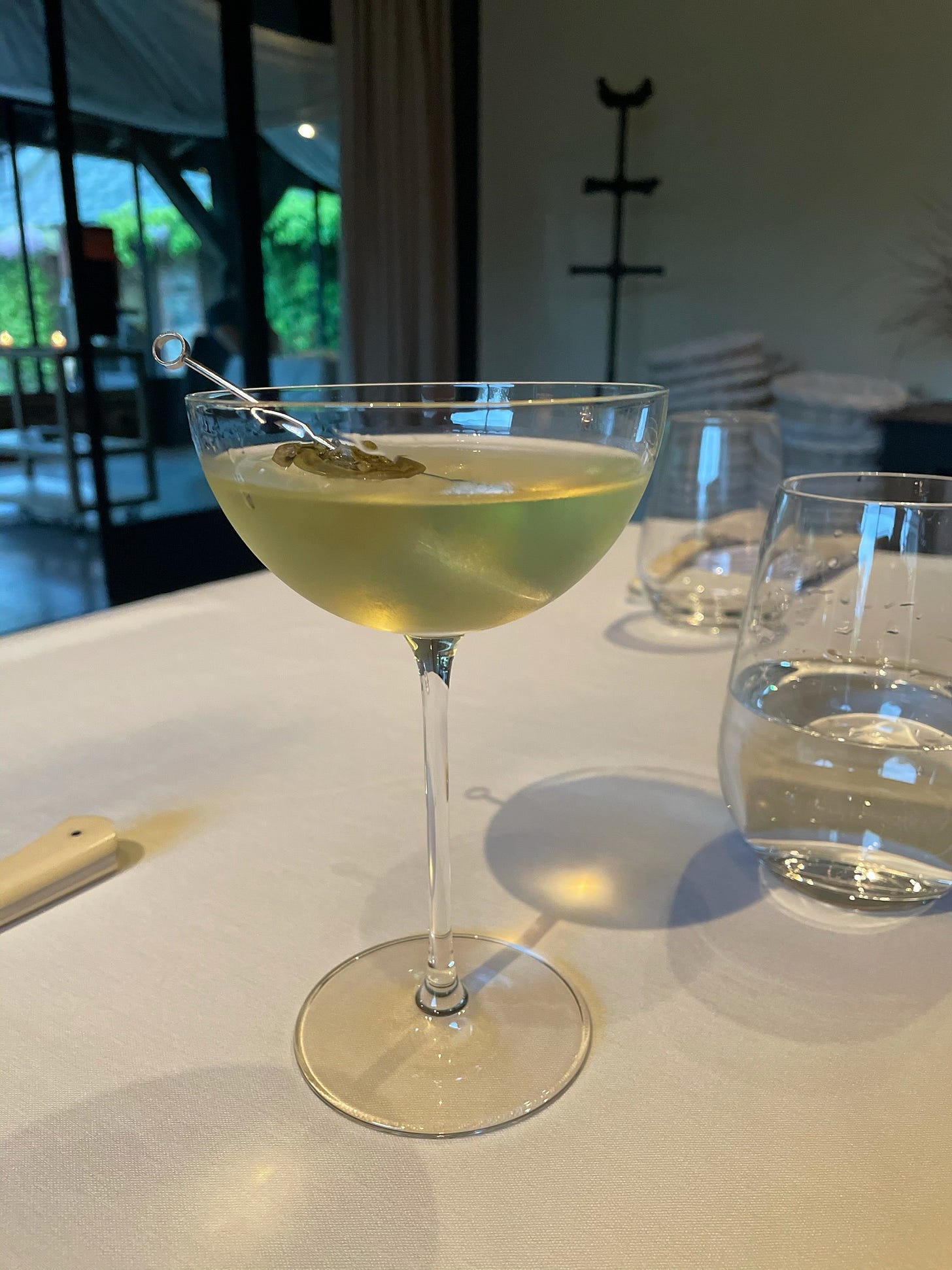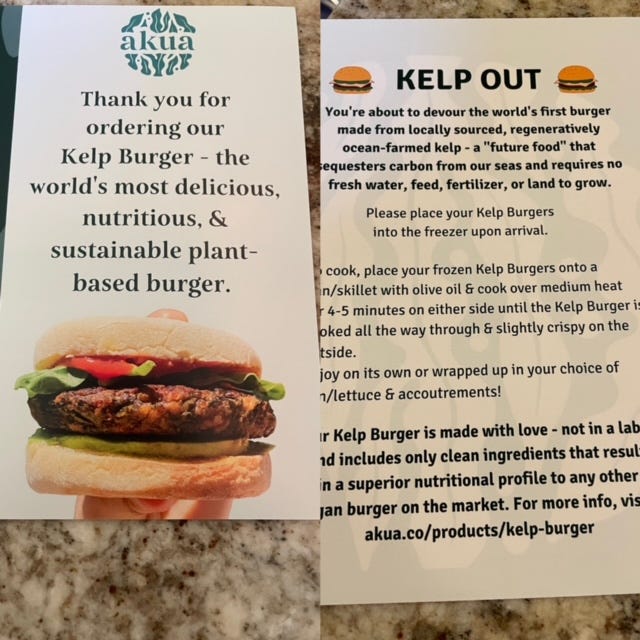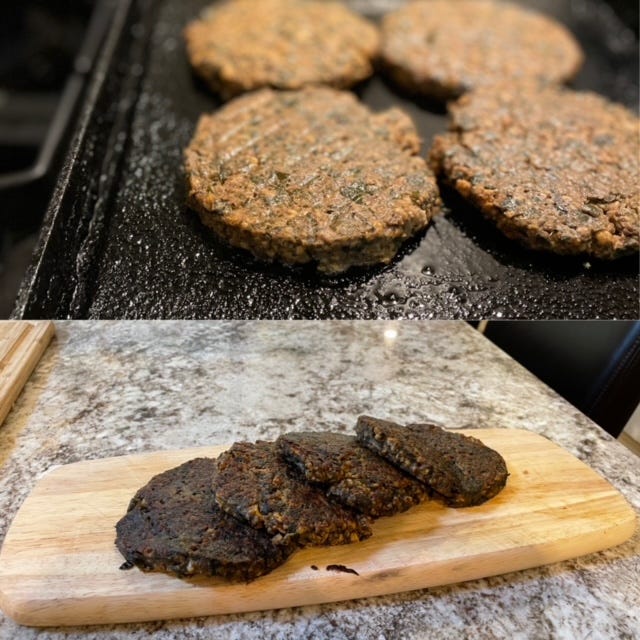In previous editions of this newsletter, we considered topics by category. Beer, for example, or meat, or milk, or coffee. This edition is different, because we’re talking about seaweed, specifically kelp, which is a bit magical, because it can reduce carbon emissions in multiple categories of the food system.
My kelp journey began in 2014 with a chance encounter in a hot tub on a roof in Monterey, where I enjoyed a cocktail with leading fish authority Paul Greenberg. The next morning, I joined Greenberg, who was researching rock fish, scuba diving in the amazing (and amazingly cold) kelp forest in Monterey Bay. I don’t remember much about the rock fish, but the kelp forrest was memorable; it felt like a canvas on which the otters, the fish and the divers were being painted.
My kelp journey continues seven years and 3,306 miles later. On Monday I arrived in Portland, Maine, which, like Asheville, is filled with microbreweries. It is a fun place with great seafood and salty characters. I was brought there by Casey Emmett, who came to my attention in the two-part series on seaweed in the How to Save a Planet podcast.
Casey and I boarded Stewart Hunt’s lobster boat and harvested about 6000 lbs of sugar kelp on a gorgeous cool sunny day. So much fun to get wet and dirty and help hard working people launch what will one day be a huge industry.
How can kelp help?
Carbon Sequestration. That’s what we’re here for. Kelp can permanently remove carbon from the atmosphere. The World Bank believes that producing 500 million tons of kelp would store 135 million tons of carbon.
Healthy Human Food. Are you a human? Eat kelp! In much of the world, kelp is a common source of nutrition. It is good for you and it can reduce your carbon footprint. See the Product Reviews below for examples.
Less Carbon Intensive Fertilizer. Most commercial fertilizer is derived from natural gas via the Haber-Bosch process. Haber-Bosch has helped us feed the world’s growing population, and today it accounts for about 1.4% of global carbon emissions. Could kelp reduce the need for fossil fuel fertilizers? Stony Brook University is exploring this concept. Fingers crossed.
Reduced Cow Methane. We know that cow methane emissions are a huge problem. A study suggests that adding a small amount (0.2% of total feed) of kelp to a cow’s diet could reduce up to 98% of the cow’s methane output.
What Else? Share your ideas for other climate-friendly uses for kelp in the comments below.
Who are the Players to Watch? Below is a not-complete list of people I’m watching.
Bren Smith: The Johny Appleseed of Kelp. Bren Smith, the author of Eat Like a Fish, and the Executive Director of Green Wave, is the Johnny Appleseed of kelp, evangelizing the opportunity for smallholders to build kelp farms at low cost to help reverse climate change.
Casey Emmett: Making Markets. Casey is the scrappy co-founder of The Crop Project. His passion for getting kelp to market is infectious. And he’s got the chops, having led sales for Health Warrior, a venture-backed food startup that enjoyed a successful exit for its investors. Casey is matching kelp farmers with processors, and identifying commercial market opportunities for the growing harvests.
David Barber: Blue Hill at Stone Barns. Last Saturday I enjoyed a gorgeous meal, made with kelp, at Blue Hill at Stone Barns (see Product Review below). David Barber, Blue Hill co-founder, explained to me how Blue Hill sent a team to visit Atlantic Sea Farms in Portland the previous week. Let’s hope more restaurants help create market demand for commercial kelp.
Briana Warner: Atlantic Sea Farms. Bri and her team at Atlantic Sea Farms are creating kelp-based foods for human consumption. Support them with your purchases.
Scout Wuerthner: Inland Lobster. Scout is the general manager of a Portland lobster processing plant that is taking a chance on kelp, processing the kelp harvest to create kelp-based food. Scout is creating opportunities for the lobster industry to succeed with kelp, as climate change threatens their way of life.
Marty Odlin: Running Tide: An organization called Running Tide is sequestering carbon in kelp permanently, by sinking kelp in deep waters where it will remain permanently.
Who Else? Share your ideas for others in the comments below.
I am inspired by these people! Although it is early days, this is an amazing ecosystem for commercializing kelp farming in the United States. Join me in supporting them and accelerating their future successes.
Your Feedback: A Tasmanian Love Story
Lawrence Cowley, from Tasmania, sent me this sweet love story about Sam and Steph, who dropped out of the urban rat race to regeneratively raise cattle to produce carbon negative beef. An inspiration! I hope to visit before long. Huge good luck to them and everyone else devoting their careers to reversing climate change with food production!
Two Product Reviews: Chef Blamey at Blue Hill Stone Barns & Akua Kelp Burgers
Review #1 Blue Hill Stone Barns. Table service chefs always lead food trends that subsequently go mainstream. I was lucky last Saturday night, 30 hours before my Maine kelp harvest, to be at Blue Hill at Stone Barns to witness Victoria Blamey celebrate the loooooong coast of her native Chile with amazing dishes from the sea. Chef Blamey knocked our socks off with one of the greatest meals of my life, at the last night of her three-week residency at Stone Barns, the former dairy barns of the Rockefeller family’s country estate near Tarrytown New York. Like the oyster liquor of a freshly shucked oyster, the kelp cocktail brought to my palette a subtle taste of the sea. The standalone kelp course was as delicious as it was elegant. Kelp deserves a seat at the culinary table.
Review #2 AKUA Kelp Burgers. For $48.99, I purchased a 12-pack of frozen kelp burgers from Akua. To be honest, I had modest expectations. But the burgers (not just kelp, by the way) were fantastically delicious, and I plan to keep my chest freezer stocked with this delicious bounty of the sea. Akua CEO Courtney Boyd Meyers describes it as an “umami bomb taste” and I agree. Highly recommended.
For your further consideration:
‘I'm not a quitter’: lobstermen turn to kelp farming in the face of climate crisis
The Monterrey Bay Aquarium Kelp Forest Clam
Four Fish: The Future of the Last Wild Food by Paul Greenberg
Sustainable, Cheap, Underrated: Clams
The kelp garden in My Octopus Teacher
Interview with Bri Warner of Atlantic Sea Farms
Study Points to Kelp Farming Opportunities on Long Island
Patagonia’s Web Site re Regenerative Organic Agriculture
A great book about the history of Haber-Bosch (reads like a thriller)
A lease with the state of Maine to farm kelp in public waters

